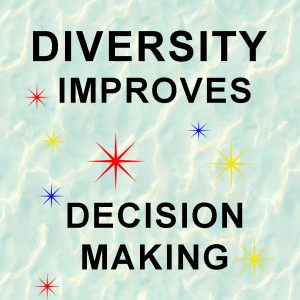 No doubt most Americans want to work for–or own–a profitable company. Various groups have researched improving the bottom line. The results are unmistakable—diverse groups make better business decisions, and diverse companies are more profitable.
No doubt most Americans want to work for–or own–a profitable company. Various groups have researched improving the bottom line. The results are unmistakable—diverse groups make better business decisions, and diverse companies are more profitable.
Professor Evan Apfelbaum, a Boston University associate professor of organizational behavior, explains, “Diverse groups tend to engage in more rigorous decision-making, more consideration of different perspectives, which lead them to decisions that are more objective; they’re less likely to make certain mistakes.”
So, why aren’t all businesses cashing in? Obviously, biases, prejudices, and stereotypes play a part. Another factor inhibiting diversity in the business sector has to do with our value systems.
Values, according to Merriam-Webster’s Online Dictionary, are those things (such as a principle or quality) that are intrinsically valuable or desirable. We develop a set of values or value systems that provide a road map for our behavior in a variety of situations. They evolve from the influences of family, society, religious training, and personal experiences. These values are so ingrained in us that we are generally not aware that they shape our decisions.
I use an exercise during diversity training that requires participants to judge five characters and rank them from most desirable to least desirable. There are no right or wrong answers. Never, in the hundreds of times I’ve done this exercise, have I had a group agree on the list.
One character, Joe, responds to a call from a friend who has lost everything in a flood. Joe, who has no money, unsuccessfully tries to get others to assist, including his rich boss. Desperate, he steals from his employer. Some picked Joe as the worst character because he broke the law, while others were more sympathetic to his actions as he was the only person willing to help someone in need. After group discussion, it is clear that each individual’s value system led to his/her specific ranking.
What if Joe had been an employee, and this diverse group had to determine his punishment if any? Hashing out these differences is not only hard work; it can sometimes be uncomfortable.
The takeaway is that operating in a diverse environment is challenging, but the rewards are immense. The key is to keep an open mind, listen carefully to the other person’s point of view, and stay flexible.
You can download the exercise, The Flood, for free at www.mariewatts.com
Sources: http://www.bu.edu/articles/2018/diversity-is-difficult/ downloaded June 19, 2020.

Recent Comments